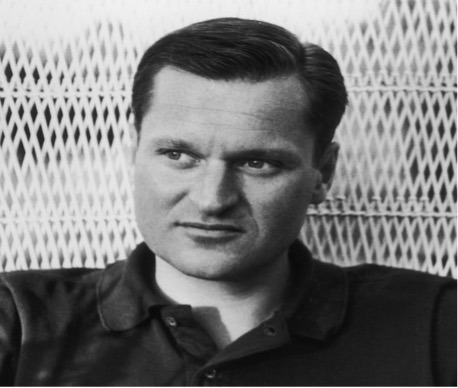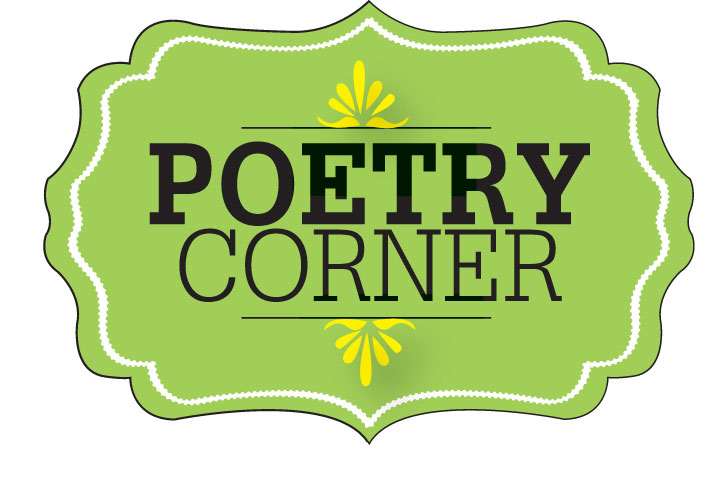By Norah Christianson
Elective Infinities
By John Ashbery
Thirsty? They race across ampersands,
scrolling. He isn’t sure it’s his head.
There’s a delay right now. Smoke backed up.
Ladies please remove hats.
It was all over by morning. The village idiot
was surprised to see us. “…thought you were in Normandy.”
Like all pendulums we were surprised,
then slightly miffed at what seemed to be happening
back in the bushes. Keep your ornaments,
if that’s what they are. Return to sender, arse.
At the intersection a statue of a policeman
was directing traffic. It seemed like a vacation,
halloween or something. Process
was the only real thing that happened.
We wove closer to the abyss, a maze of sunflowers.
The dauphin said to take our time.
I want you to know that John Ashbery (1927 – 2017) won almost every big poetry prize there is to win (the Yale Younger Poets Prize, the Pulitzer Prize, the National Book Award, the Bollingen Prize, the Ruth Lilly Poetry Prize, the Griffin International Award, and a MacArthur “Genius” Grant).
I want you to know that he graduated from Harvard cum laude, that he was Poet Laureate of New York, and that he is considered one of the greatest 20th century American poets. The critic Landon Hammer has said, “No figure looms so large in American poetry over the past 50 years as John Ashbery.”
Ashbery’s first ambition was to be a painter: from the age of eleven until he was fifteen, Ashbery took weekly classes at the art museum in Rochester, NY. It has been pointed out by many critics and savants that Ashbery was deeply influenced by abstract expressionism, a movement in modern American painting that stressed nonrepresentational methods of picturing reality.

You will have noticed that you couldn’t understand his poem “Elective Infinities.” All his poems are incomprehensible (check them out), so don’t feel bad. I don’t understand them either. (The Yale Younger Poets Prize competition was judged by W.H. Auden, who famously confessed later that he hadn’t understood a word of the winning manuscript.) And though I never went to the famous Iowa Writers’ Workshop, and though I come from a tiny town in tiny Rhode Island, and though I don’t have a Ph.D. or an M.D. or even an M.B.A., and though no one will care, let alone sue me, I stand before you to tell you that John Ashbery, the Emperor of American Poetry, has no clothes. I like him less than I like Marjorie Taylor Greene. I think he is a fraud.
So let us go back to his influences—those abstract expressionists of the late forties, mid-1950’s. (I so wish Ashbery had stuck to art.) I like abstract expressionist paintings. Not because they have meaning—they don’t. But because I love color and form. I like de Kooning, Motherwell, Franz Kline and Rothko. I can also like a realistic painting of a tree, even though it also doesn’t have meaning. I can dislike the Mona Lisa, but I don’t dislike her because I don’t like her “meaning.” I dislike her because I don’t like the visual experience of her. (Such a vapid face!)
So, visual experiences do not have to have meaning. But language has to mean something…because it is language! Built to communicate! Cognitive! Brain-born!
So. Ashbery is known for the obscurity of his work. It’s his “thing.” He’s KNOWN for it. To me, that’s like being known for not being toilet trained. The critic Stephanie Burt once wrote that, though we cannot understand Ashbery’s poems, “… they make up for it in their range of tones—befuddled, affectionate, bubbly, chastened, sombre, alarmed, and then befuddled again.” That sounds like my average day, not something I’d like to read to help me understand life, feel empathy or sorrow or joy or beauty.
So why am I introducing this poet to you? Just so you know? Am I just jealous? Why am I denigrating him? Because I always wanted to be a whistle blower? And what good is that? The man is already dead. He won all the prizes. His reputation is carved in stone. He’s thought to be, by those dwelling in the Ivory Tower, the greatest 20th-century American poet. But I believe that Ashbery’s own Ivory Tower is made of plastic. And I wanted to “speak my truth,” as the idealists, politicians and trendy therapists like to say.
Ashbery once said that his goal was “…to produce a poem that the critic cannot even talk about.” Well, I’m talking about it. What I deplore is Ashbery’s influence on so many contemporary poets who now write just like him.
But let’s look at clouds from both sides now. Perhaps Ashbery had a big heart.
Perhaps there was a secret meaning he had in mind behind writing all those senseless poems. Perhaps he secretively meant for his poems to prepare us for a world that seems to be losing its meaning. To get us comfortable with irrationality. Perhaps. If so, I do not thank him. Ashbery has not helped us be at ease with irrationality. He has simply added to the confusion.



